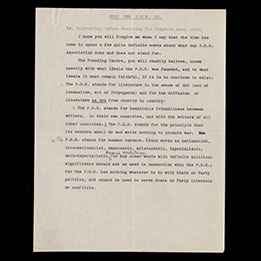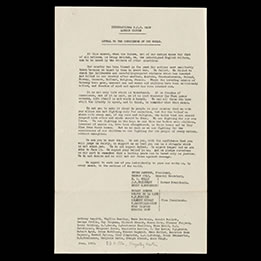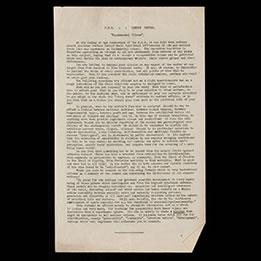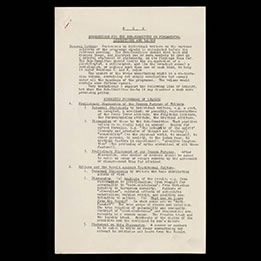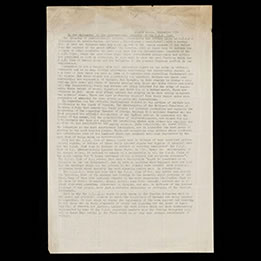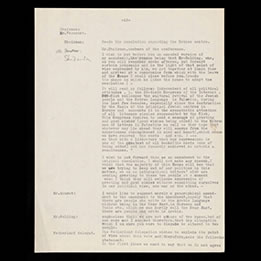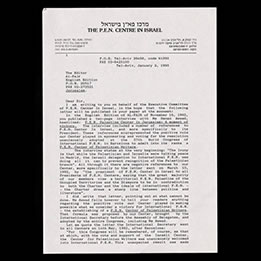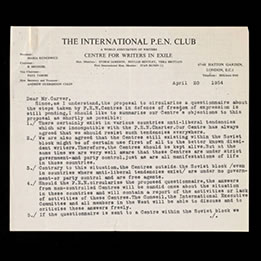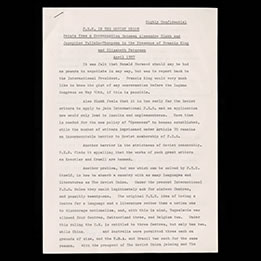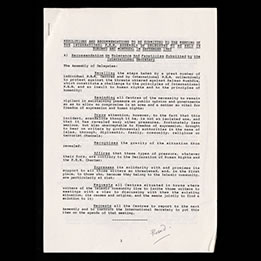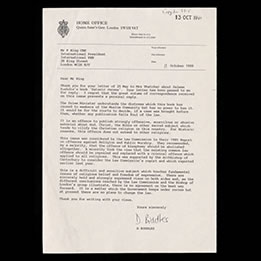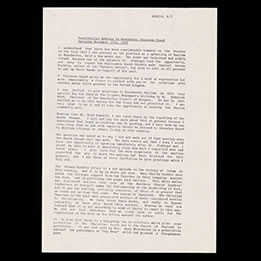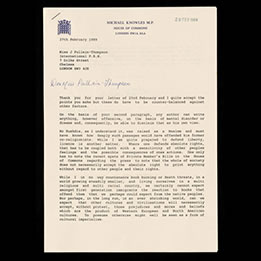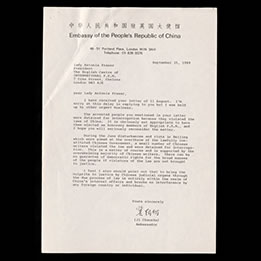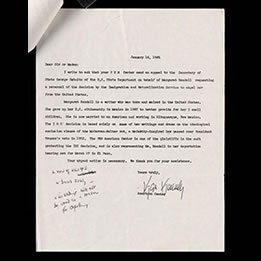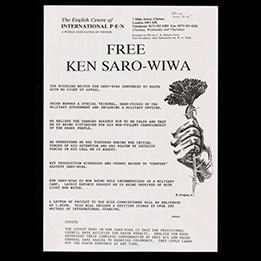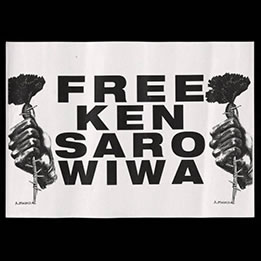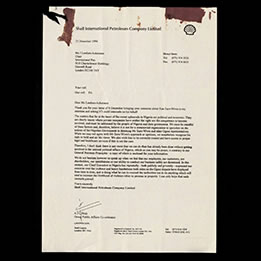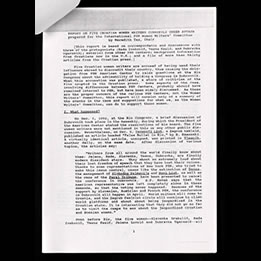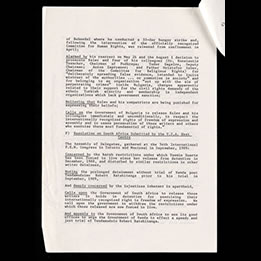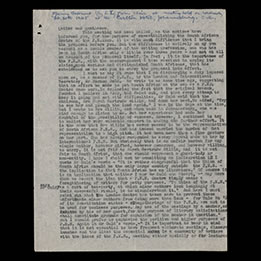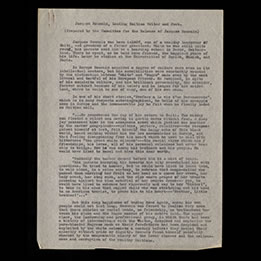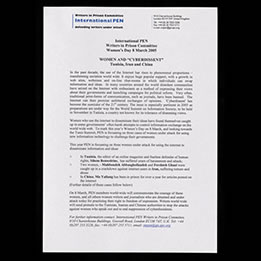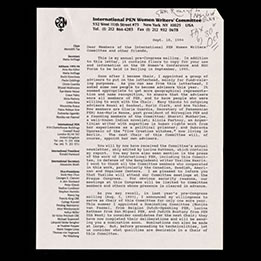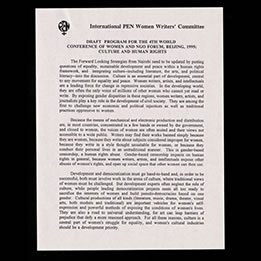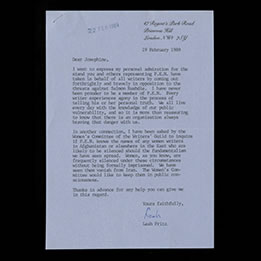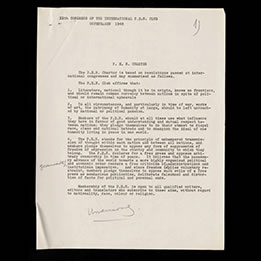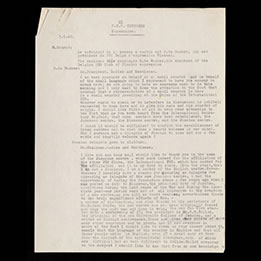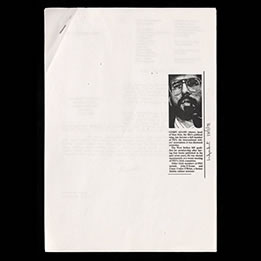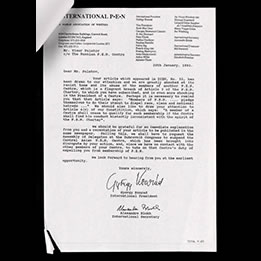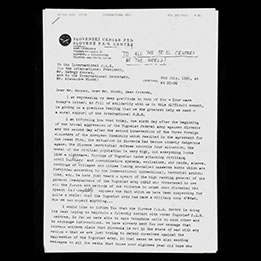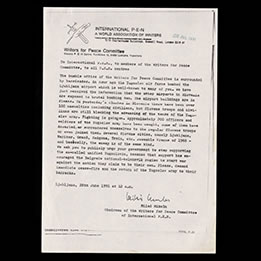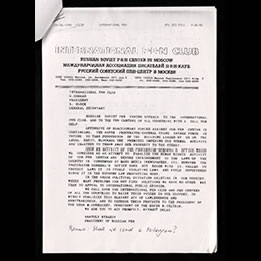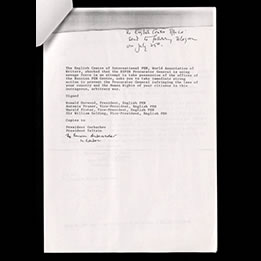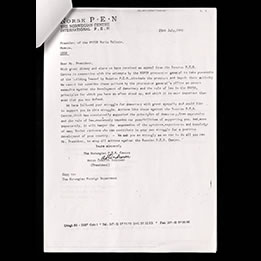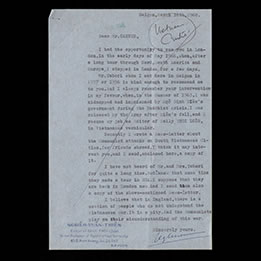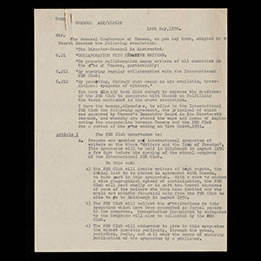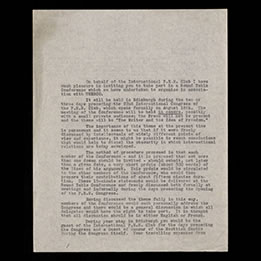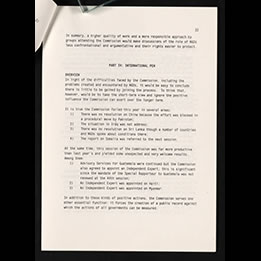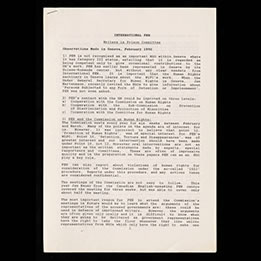International Human Rights
Writers and Free Speech
Writers in Exile / Global
Refugees
Writing the Cold War
Writing World War II
Digital Collections
International Human Rights
PEN was founded in 1921, predating the adoption of the Universal Declaration of Human Rights by the United
Nations in 1948. PEN did not always consider itself an international human rights organization. The fact that
it became one of the oldest of such organizations was due to a complex set of circumstances and changing
international pressures that pushed PEN to act on its writers' behalf. This is not to claim that PEN was a
reluctant human rights organization. Instead, it is to acknowledge the many ways PEN sought to alter its
mission, and its goals to maintain the commitment to the organization's founding values. The materials in this
guide highlight PEN's responses to these pressures, and its interventions in response to a number of human
rights issues, from gender-based discrimination, to the suppression of free speech, to the incarceration of
dissident writers and activists. By engaging with these materials, students will have the opportunity to
track, across many different circumstances, PEN's evolving understanding of itself and of international human
rights as a political concept.
Fundamental Values: PEN and Human Rights
While PEN was founded as a social club for English writers, its rapid growth on an international scale soon
forced the organization to reckon with the political differences between its increasingly diverse member
centres. While John Galsworthy (first President of PEN International and 1932 Nobel laureate in literature)
could state in 1932 that PEN "has nothing whatever to do with State or Party politics," the rising crisis of
World War II demonstrated the need for the organization to define its political allegiances and principles.
These materials offer snapshots of PEN's developing stance towards writers' social and political
responsibilities before, during, and after World War II. Students might use these documents not only to
understand the history of PEN, but also to consider what political responsibilities are shared by writers,
artists, and other public figures, and how these responsibilities are identified or adopted. How does
Galsworthy's claim that "PEN stands for humane conduct," for example, transform into an international focus on
what we now refer to as "human rights"?
View Item
"What the P.E.N. Is." Opening Remarks by John Galsworthy written for the 10th International PEN
Congress, Budapest, Hungary. 1932.
PEN Records 81.3
View Item
"Appeal to the Conscience of the World," letter from PEN London Centre. June 1940.
PEN Records 91.5
View Item
"Fundamental Values," letter to PEN members from PEN London Centre. 1943.
PEN Records 110.3
View Item
"Suggestions for the Sub-Committee on Fundamental Assumptions and Values," proposed program for a PEN
symposium. 1943.
PEN Records 110.3
PEN and Politics
As PEN's principles evolved, the organization's commitment to free expression as a fundamental human right
came to play a central role in its political negotiations, both internally and in the public eye. Tensions
arose between PEN's founding centres in the U.K., America, and Western Europe and centres in countries whose
political regimes were often hostile to the ideals being written into the PEN Charter. While PEN's
international leadership sought to avoid political conflicts or partisanship, it often had to reckon with
contradictions between the organization's core values and the concerns of writers with complex political
allegiances. The materials below help illustrate tensions in PEN, both internally (between centres in Soviet
countries and those in the West during the Cold War), and externally (between members of "official" PEN
centres endorsed by authoritarian regimes and other writers being repressed by these regimes). Students
approaching these materials might consider how they illustrate the conflicting values and interests at work in
any international organization, and what happens when a commitment to human rights runs up against other
organizational priorities, like promoting dialog between opposing nations who disagree on what those rights
entail.
View Item
Letter from Agrupación de Intelectuales, Artista, Periodistas y Escritores (A.
I. A. P. E.) to delegates of the 14th International PEN Congress in Buenos Aires, Argentina, with
Spanish and French translations. September 1936.
PEN Records 83.2
View Item
Proceedings and Resolution regarding the PEN Hebrew Centre from the 20th
International PEN Congress, Copenhagen, Denmark. June 3, 1948.
PEN Records 87.5
View Item
Letter from Hanoch Bartov, President of PEN Israel, to the Editor of Al-Fajr [English
Edition]. January 2, 1993.
PEN Records 209.3
View Item
Letter from Friedrich Bruegel, chairman of PEN Centre for Writers in Exile, to David Carver. April
20, 1954.
PEN Records 155.4
View Item
"P.E.N. In The Soviet Union," confidential memorandum of a conversation between Alexandre Blokh and
Josephine Pullein-Thompson. April 1987.
PEN Records 257.7
Religious Freedom and Tolerance
These materials illustrate PEN's reckoning with the tension between religious freedom and freedom of speech
in the Salman Rushdie crisis of 1989. While PEN centres around the globe denounced the fatwa against Rushdie,
debates soon arose in the United Kingdom regarding what happens when a writer's words violate core tenets of a
particular religious system. As Muslim groups in the U.K. called for Rushdie's works to be banned under a
longstanding anti-blasphemy law, British clerics, politicians, and intellectuals all weighed in on where to
set the boundaries between the fundamental human rights of free expression and religious tolerance. Students
working with these materials might consider what happens when human rights seem to conflict: who interprets
these rights? Who decides what is protected, and what is not? What power dynamics are involved in the decision
to defend some liberties at the expense of others?
View Item
"Recommendation on Tolerance and Fanaticism Submitted by the International
Secretary," memo for International PEN Assembly of Delegates in Toronto and Montreal. September 1989.
PEN Records 223.1
View Item
Letter from the U.K. Home Office to Francis King regarding U.K. anti-blasphemy laws. October 11,
1989.
PEN Records 262.4
View Item
Presidential Address from the Bishop of Manchester to Diosecan Synod regarding Rushdie death threats.
November 25, 1989.
PEN Records 262.4
View Item
Correspondence between Josephine Pullein-Thompson and Michael Knowles, M. P.
regarding Salman Rushdie case. February 28—March 21, 1989.
PEN Records 262.3
Protest and Incarceration
These materials mark points of conflict between writers (and organizations like PEN) and governments over the
definition, application, and protection of human rights. In the latter half of the twentieth century, PEN
repeatedly advocated for writers facing imprisonment, deportation, and even death, at the hands of the
political regimes they opposed. From Chinese writers and scholars imprisoned after the Tiananmen Square
protests to an American poet and activist at risk of deportation for her support of socialist ideas, these
writers' right to free speech was often limited as a result of their advocacy for other human rights being
denied by the governments they criticized. These materials offer students an opportunity to consider the
fraught relationship between state power and human rights. How does free speech relate to other rights like
free movement, equal representation, or economic and environmental justice? How have governments and
corporations justified the curtailment of these rights?
View Item
Letter from Chinese Ambassador Ji Chaozhu to Antonia Fraser. September 15, 1989.
PEN Records 242.5
View Item
Correspondence regarding the deportation of Margaret Randall between the PEN
American Center, Josephine Pullein-Thompson, and George Shultz, U.S. Secretary of State. January 16,
1986 and February 26th, 1986.
PEN Records 257.7
View Item
"Free Ken Saro-Wiwa," protest information sheet from PEN Writers in Prison Committee. November 9,
1995.
PEN Records 246.4
View Item
Protest sign for PEN Writers in Prison Committee event in support of Ken Saro-Wiwa. Circa 1995.
PEN Records 361.3
View Item
Letter from Shell International to PEN International Chair Joanne Leedom-Ackerman regarding Ken
Saro-Wiwa. December 21, 1994.
PEN Records 246.3
View Item
"Report on Five Croatian Women Writers Currently Under Attack," report to International PEN Women
Writers' Committee. February 20, 1993.
PEN Records 209.3
Writing on the Silences: What Is Missing?
PEN would have to grapple with a complex set of binaries as it positioned itself as a human rights
organization. Some of these include: local versus global, home versus exile, free speech versus dissent. It
would also have to contend with conflicts and disagreements that were bound up in other more intractable
disputes such as religious conflicts and the legacies of colonialism embedded in racial and gender politics of
the time. We can search through the collection and find fierce advocacy for some writers, but no evidence of
protection for others.
View Item
"Resolution on South Africa Submitted by the U.S.A. West Centre," for
International PEN Assembly of Delegates in Toronto and Montreal. September 1989.
PEN Records 223.1
View Item
Opening Statement by Lily Tobias for a meeting of the South African PEN Club
at the Carleton Hotel in Johannesburg, South Africa. February 28, 1945.
PEN Records 54.2
View Item
Two poems by Jacques Roumain, "Guinea" and "When the Tom Tom Beats," and a typescript account about
the author. 1935.
PEN Records 77.2
Women's Rights and Expression
PEN expanded the definition of its political and ethical responsibilities in the decades following the Second
World War, which saw the creation of a number of new committees aimed at addressing specific international
issues. The PEN International Women Writers' Committee was developed in response to a sense that the
challenges facing writers around the globe often had a greater urgency for women—particularly those working in
countries and cultures with a history of patriarchy and gender-based discrimination. While the formation of
the Committee was met with some controversy (see the "Writers and Free
Speech" teaching guide for materials that document this), it led to a number of efforts on the behalf of
women writers being silenced by their own governments. PEN was largely founded by women, and developed many of
its humanitarian programs under the guidance of women officers, including Storm Jameson, Janet Chance,
Josephine Pullein-Thompson, and many others. These materials offer a glimpse at contemporary efforts by PEN
and other advocacy groups to address ongoing issues of gender discrimination and human rights violations
against women. Students might use these materials to explore how discussions of human rights have
coincided—and clashed—with those of women's rights and gender equality. How have women been excluded from
accessing the rights and privileges extended to men? How do women writers respond to this? What strategies are
available to feminist writers and thinkers to combat patriarchy?
View Item
"Women and 'Cyberdissent': Tunisia, Iran and China," PEN Writers in Prison Committee program for
Women's Day. March 8, 2005.
PEN Records 248.1
View Item
Letter from Meredith Tax to Members of the International PEN Women Writers' Committee. September 18,
1994.
PEN Records 242.3
View Item
"Draft Program for the 4th World Conference of Women and NGO Forum, Beijing, 1995: Culture and Human
Rights." 1995.
PEN Records 242.3
View Item
Letter from Leah Fritz to Josephine Pullein-Thompson regarding Afghan women writers in response to
Rushdie case. February 19, 1989.
PEN Records 262.4
Dissidents within PEN: Enforcing the Charter
Part of PEN's development into an international human rights organization was the creation and evolution of
the PEN Charter, a
document each new member signs upon joining the club. The first official PEN Charter was ratified in 1948, as
the organization began to reckon with the aftermath of World War II and the beginnings of the Cold War. Aside
from a 2017 amendment extending the "hatreds" which all PEN members must oppose from those of "race, class,
and nation" to "all hatreds," the Charter has been a touchstone for the institutional values shaped during
World War II. The materials below document the ratification of the Charter and offer examples from PEN's
history in which it had to be invoked against members who violated its principles. Students might consider the
historical context of the first Charter's ratification, or the political tensions that produced the need to
state principles that had previously been merely implicit to the organization. How does the Charter speak to
the vast range of cultural difference represented in PEN's global centres? How can documents like this, or the
United Nations' Universal Declaration of Human Rights, cut across international boundaries? What do these
documents enable, and what are their shortcomings?
View Item
"P.E.N. Charter," from the 20th International PEN Congress, Copenhagen, Denmark. 1948.
PEN Records 87.5
View Item
Proceedings regarding the ratification of the PEN Charter from the 20th International PEN Congress,
Copenhagen, Denmark. June 3, 1948.
PEN Records 87.5
View Item
Correspondence and press clipping related to Gerry Adams's membership in Irish PEN. January 1991.
PEN Records 209.2
View Item
Letter from György Konrád, PEN International President, to Timur Pulatov, President of the Central
Asian Republics P.E.N. Centre. January 26, 1993.
PEN Records 209.4
War and Conflict
PEN's modern identity was forged in the conflict of World War II, and the organization would continue to
intercede in the many armed conflicts that took place in the years that followed. As PEN ratified its Charter
and began to define its role as a human rights organization, advocating for international peace and dialogue
among nations became a central part of PEN's mission. This emphasis on peace emerged from the tension between
PEN's initial desire to remain out of politics—seen in the organization's refusal to take sides in disputes
like the Israeli/Palestinian conflict—and its commitment to combating the suppression of human rights like
free speech and political self-determination. The materials below offer a glimpse at a number of late
twentieth-century conflicts as they were experienced by PEN and its members. If PEN was not always mightier
than the sword, the organization nevertheless worked tirelessly to communicate with heads of state, spread
word of attacks and human rights violations, and encourage cultural exchange between warring nations in the
pursuit of peace. These items provide students a window into the experience of modern conflict, and invite
discussion of the role of Non-Governmental Organizations (NGOs) in offering nonviolent responses to violent
situations.
View Item
Letter from Boris A. Novak, President of the Slovene P.E.N. Centre, to PEN International. July 2,
1991.
PEN Records 209.2
View Item
Letter from Miloš Mikeln, Chairman of PEN Writers for Peace Committee, to PEN International. June 28,
1991.
PEN Records 209.2
View Item
Letter from Anatoly Rybakov, President of Russian PEN, to PEN International. July 24, 1991.
PEN Records 209.5
View Item
Telegram from English PEN Centre to Mikhail Gorbachev and Boris Yeltsin. July 25, 1991.
PEN Records 209.5
View Item
Letter from Anton Fredrik Andresen, President of Norwegian PEN Centre, to President Boris Yeltsin.
July 25, 1991.
PEN Records 209.5
View Item
Letter from Nghiêm Xuân Thiện to David Carver and "South Vietnam Bloody New Year," a newsletter by
Nghiêm Xuân Thiện. March 16, 1968.
PEN Records 154.4
PEN and NGOs
As PEN evolved, it developed relationships with other international organizations and writers' groups. Its
advocacy for writers, human rights, and freedom of expression led to natural partnerships with groups like
Article 19, the United Nations, and UNESCO. These relationships offered PEN both financial support and further
avenues for influencing governments on behalf of writers around the globe. The materials below highlight some
of these partnerships, offering students a chance to observe what roles PEN played in these larger
organizations, as well as the limitations faced by a writers' group without governmental affiliation or large
amounts of funding. These materials might prompt discussions of the extent to which NGOs are (and are not)
able to influence governments and policies to support human rights around the globe.
View Item
Memorandum of agreement between PEN and UNESCO. May 19, 1950.
PEN Records 100.6
View Item
Letter of invitation to PEN/UNESCO Conference: The Writer and the Idea of Freedom. 1950.
PEN Records 100.6
View Item
"Part IV: International PEN" in Report to International PEN on the United
Nations Commission on Human Rights, 46th Session, Geneva, 29 January to 9 March 1990. March 30, 1990.
PEN Records 242.5
View Item
"Observations Made in Geneva," by PEN Writers in Prison Committee. February 1990.
PEN Records 242.5
We have attempted to minimize harm or adverse impact by selecting primary sources
that we believe will not place people at risk. Please notify us at reference@hrc.utexas.edu if you believe we need to remove any
materials from this digital collection.
Takedown Notice: This material is made available for education and research
purposes. The Harry Ransom Center does not own the rights for these items; it cannot grant or deny permission
to use this material. Copyright law protects unpublished as well as published materials. Rights holders for
these materials may be listed in the WATCH
file. It is your responsibility to determine the rights status and secure whatever permission may be
needed for the use of any item. Due to the nature of archival collections, rights information may be
incomplete or out of date. We welcome updates or corrections. Upon request, we'll remove material from public
view while we address a rights issue.


